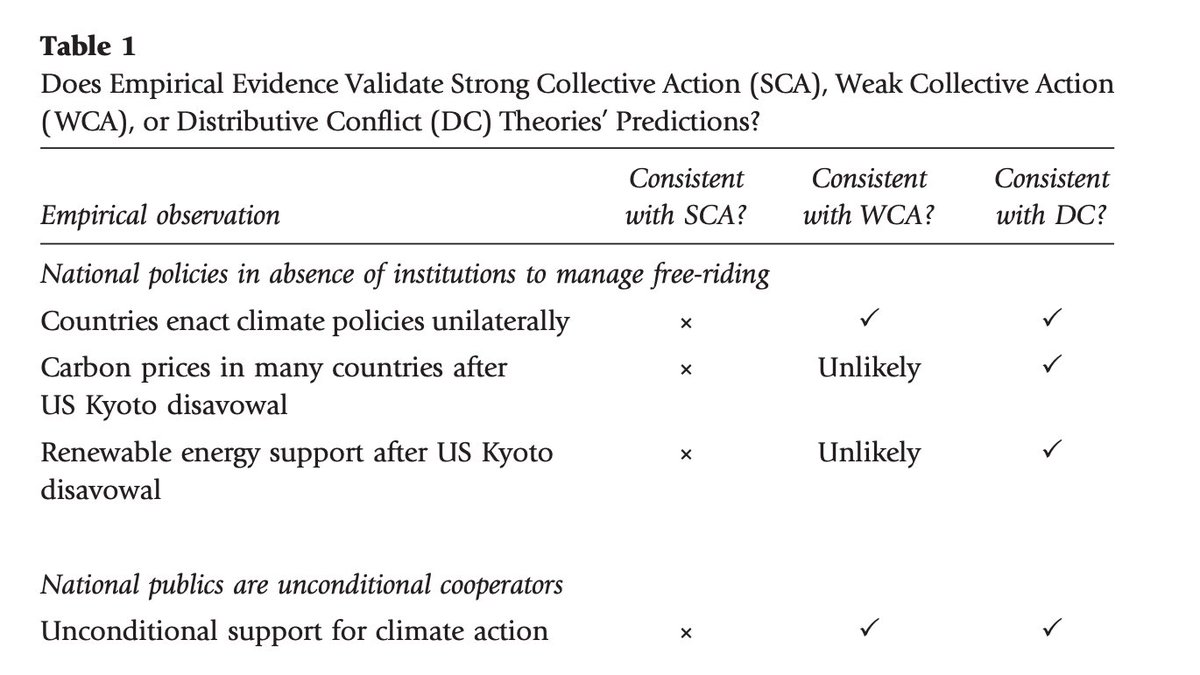Exciting news! @MichaelAklin and my new provocation is out in @GepJournal. We make a simple but far-reaching claim. **Empirically, climate politics is NOT primarily about collective action or free-riding**. A quick  https://abs.twimg.com/emoji/v2/... draggable="false" alt="🧵" title="Thread" aria-label="Emoji: Thread">on why we& #39;ve all been prisoners of the wrong dilemma 1/
https://abs.twimg.com/emoji/v2/... draggable="false" alt="🧵" title="Thread" aria-label="Emoji: Thread">on why we& #39;ve all been prisoners of the wrong dilemma 1/
For decades now, we& #39;ve all assumed that free-riding is the binding constraint on global climate politics. Google "climate change" and "free-riding", and it generates 18000+ unique hits. Economists mince few words about this. Here& #39;s a Nordhaus quote for flavor: 2/
The logic of free-riding seems powerful. No country can solve climate change alone. But acting is costly. So every country wants to free-ride off of other country& #39;s action. But then no-one has an incentive to act. 3/
It& #39;s a fabulous idea. And you literally cannot overstate its influence. We& #39;ve structured decades of climate negotiations on the assumption it is true. But is it? Do the empirics match this reality we& #39;ve constructed? The surprising answer: not really! 4/
In our article, @MichaelAklin and I review the empirical evidence to evaluate whether it& #39;s consistent with our dominant collective-action flavored theory of climate politics. Shocking fact: we can& #39;t find ANY empirical evidence that shows it to be clearly correct. 5/
Instead, our review points to three things:
 https://abs.twimg.com/emoji/v2/... draggable="false" alt="1⃣" title="Tastenkappe Ziffer 1" aria-label="Emoji: Tastenkappe Ziffer 1">National policy action occurs in the absence of institutions to manage free-riding. For example, US leaving Kyoto did not alter pace of reforms in other countries. 6/
https://abs.twimg.com/emoji/v2/... draggable="false" alt="1⃣" title="Tastenkappe Ziffer 1" aria-label="Emoji: Tastenkappe Ziffer 1">National policy action occurs in the absence of institutions to manage free-riding. For example, US leaving Kyoto did not alter pace of reforms in other countries. 6/
In short, we can& #39;t actually locate any empirical evidence to suggest that free-riding in practice constrains global climate politics, even though policymakers and academics have blindly assumed this fact for decades. Much more on this in paper (and more nuanced too!). 9/
So what explains climate politics if not free-riding concerns? We think economic conflict between policy winners and losers is the real binding constraint on global climate politics. It can account for existing empirical evidence more completely *and* parsimoniously. 10/
Our provocation is also intended as an appeal to the wider community. Our work on this is ongoing - we want to know your most persuasive empirical evidence for free-riding in climate politics. Also, happy to share our paper if you don& #39;t have access. 11/ https://www.mitpressjournals.org/doi/full/10.1162/glep_a_00578">https://www.mitpressjournals.org/doi/full/...
We& #39;ve spent four decades assuming international institutions should primarily remedy free-riding. But maybe that& #39;s the wrong dilemma! Given the urgency of the threat, we can& #39;t risk our climate politics being a prisoner of the wrong theories. The stakes are too high. 12/12
PS: Our article leads a @GepJournal special issue addressing this need. First, a @thomasnhale article on "catalytic cooperation". Hale describes how a wide range of global problems can be addressed through the leadership of a proactive country. https://www.mitpressjournals.org/doi/full/10.1162/glep_a_00561">https://www.mitpressjournals.org/doi/full/...
Next, an article by @fgenovese86 and @pol_economist. Using survey experiments, they show that information about *domestic* distributional effects of climate policies is more valued by people than information about policy decisions abroad. https://www.mitpressjournals.org/doi/full/10.1162/glep_a_00577">https://www.mitpressjournals.org/doi/full/...
Finally, @khar1958 provides a careful comparative analysis of local politics in Canada and the United States and how it affects coal projects.
All three papers are terrific and worth a careful read. https://www.mitpressjournals.org/doi/full/10.1162/glep_a_00579">https://www.mitpressjournals.org/doi/full/...
All three papers are terrific and worth a careful read. https://www.mitpressjournals.org/doi/full/10.1162/glep_a_00579">https://www.mitpressjournals.org/doi/full/...

 Read on Twitter
Read on Twitter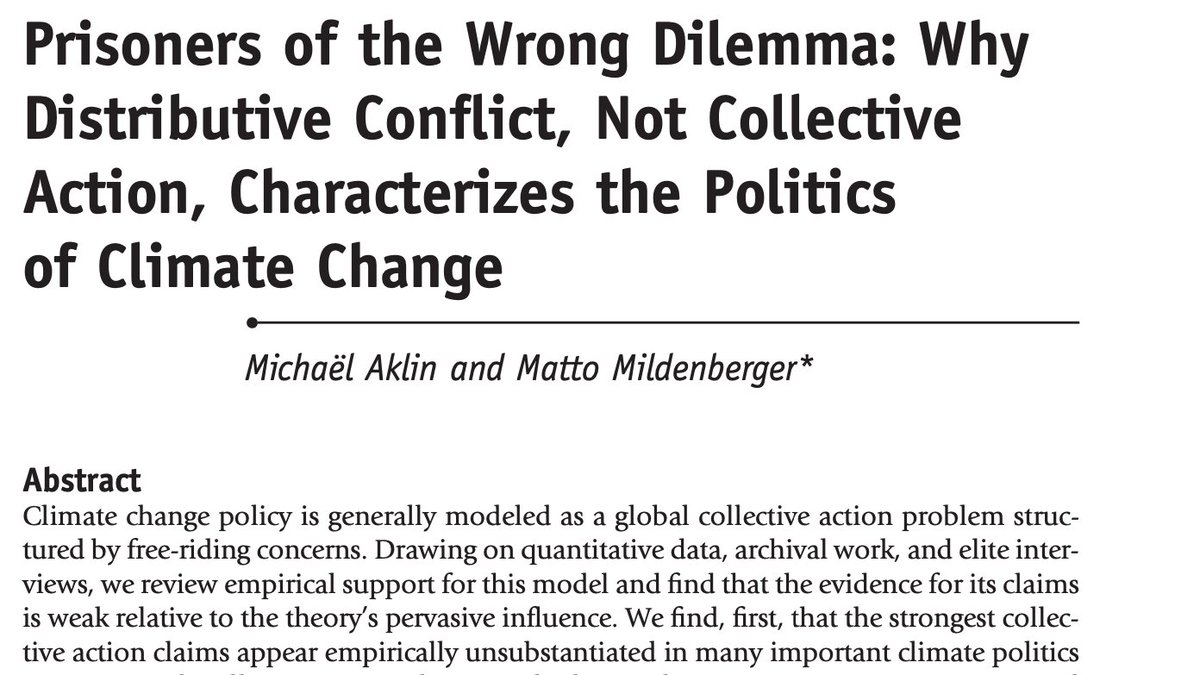 on why we& #39;ve all been prisoners of the wrong dilemma 1/" title="Exciting news! @MichaelAklin and my new provocation is out in @GepJournal. We make a simple but far-reaching claim. **Empirically, climate politics is NOT primarily about collective action or free-riding**. A quick https://abs.twimg.com/emoji/v2/... draggable="false" alt="🧵" title="Thread" aria-label="Emoji: Thread">on why we& #39;ve all been prisoners of the wrong dilemma 1/" class="img-responsive" style="max-width:100%;"/>
on why we& #39;ve all been prisoners of the wrong dilemma 1/" title="Exciting news! @MichaelAklin and my new provocation is out in @GepJournal. We make a simple but far-reaching claim. **Empirically, climate politics is NOT primarily about collective action or free-riding**. A quick https://abs.twimg.com/emoji/v2/... draggable="false" alt="🧵" title="Thread" aria-label="Emoji: Thread">on why we& #39;ve all been prisoners of the wrong dilemma 1/" class="img-responsive" style="max-width:100%;"/>
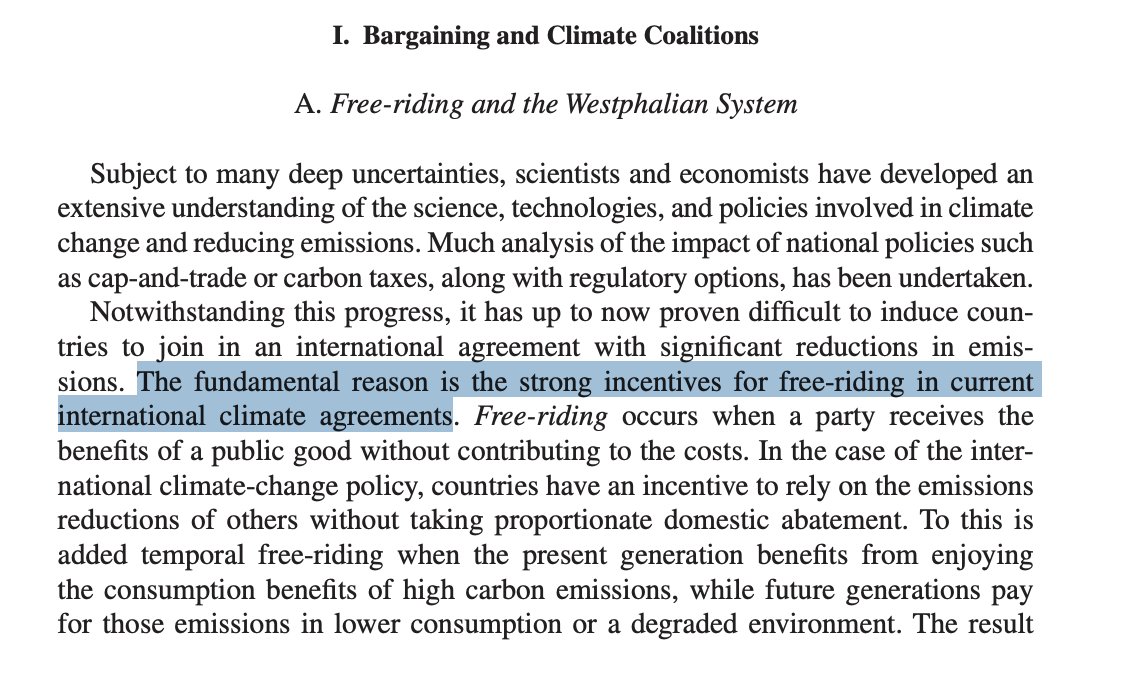

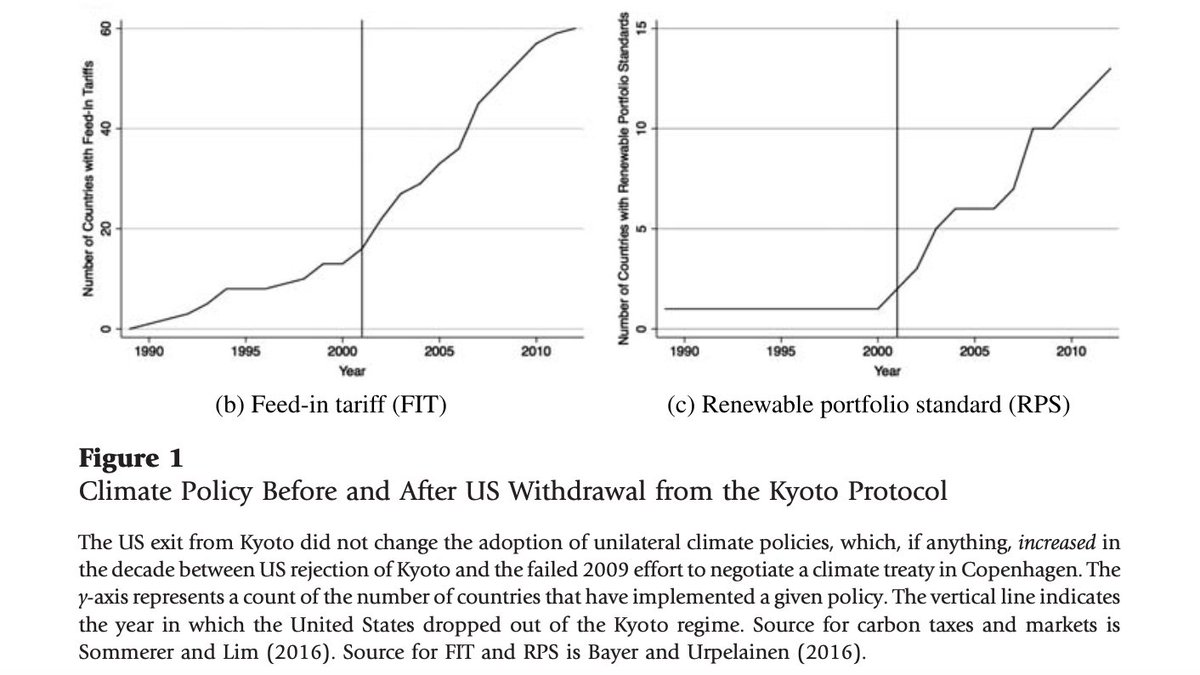 National policy action occurs in the absence of institutions to manage free-riding. For example, US leaving Kyoto did not alter pace of reforms in other countries. 6/" title="Instead, our review points to three things:https://abs.twimg.com/emoji/v2/... draggable="false" alt="1⃣" title="Tastenkappe Ziffer 1" aria-label="Emoji: Tastenkappe Ziffer 1">National policy action occurs in the absence of institutions to manage free-riding. For example, US leaving Kyoto did not alter pace of reforms in other countries. 6/" class="img-responsive" style="max-width:100%;"/>
National policy action occurs in the absence of institutions to manage free-riding. For example, US leaving Kyoto did not alter pace of reforms in other countries. 6/" title="Instead, our review points to three things:https://abs.twimg.com/emoji/v2/... draggable="false" alt="1⃣" title="Tastenkappe Ziffer 1" aria-label="Emoji: Tastenkappe Ziffer 1">National policy action occurs in the absence of institutions to manage free-riding. For example, US leaving Kyoto did not alter pace of reforms in other countries. 6/" class="img-responsive" style="max-width:100%;"/>
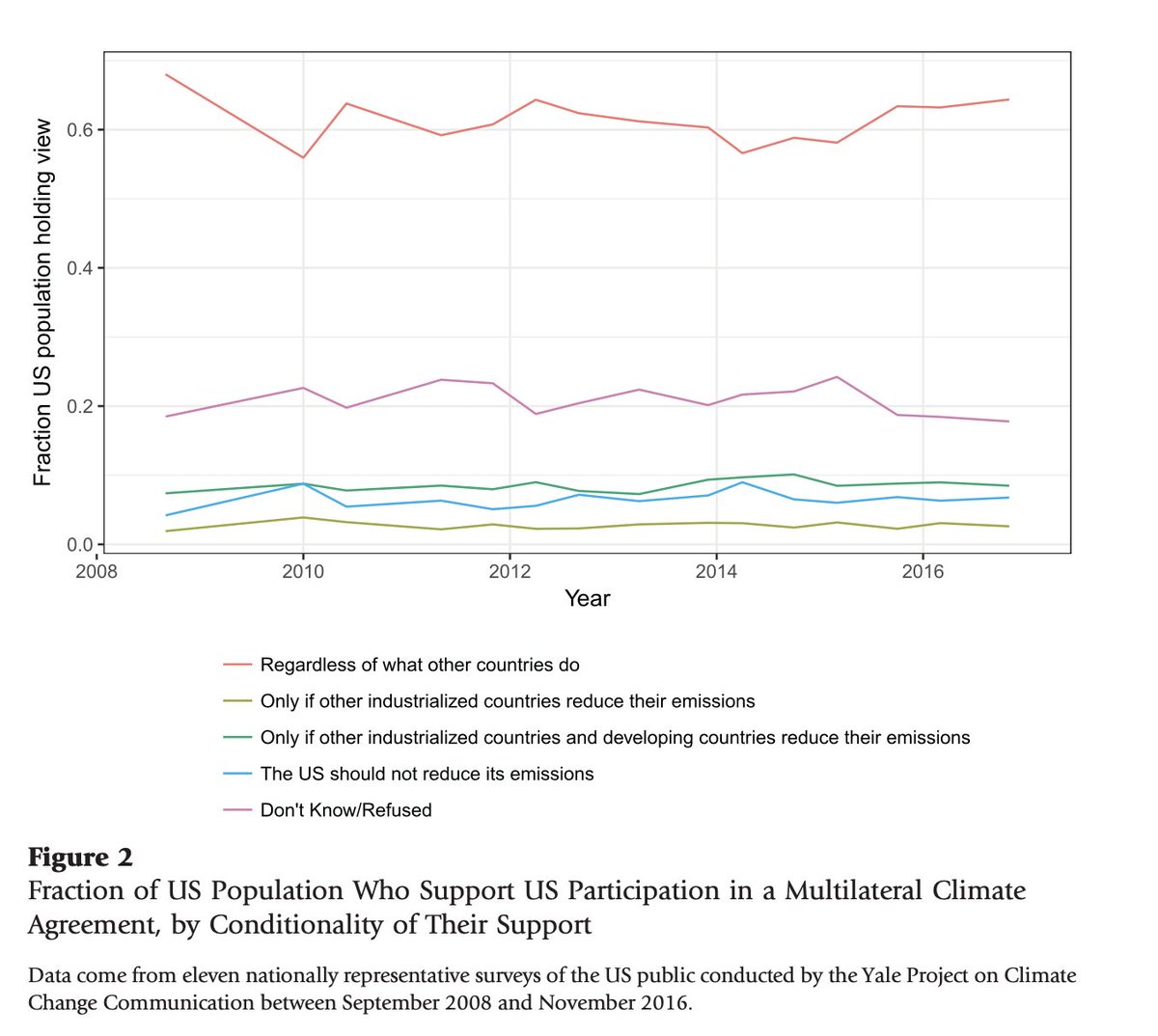 The public behaves like an unconditional climate cooperator! Most experiments and surveys do not find evidence that public support for action goes down in the presence of free-riding. Here is a US time-series courtesy of @YaleClimateComm as one example: 7/" title="https://abs.twimg.com/emoji/v2/... draggable="false" alt="2⃣" title="Tastenkappe Ziffer 2" aria-label="Emoji: Tastenkappe Ziffer 2">The public behaves like an unconditional climate cooperator! Most experiments and surveys do not find evidence that public support for action goes down in the presence of free-riding. Here is a US time-series courtesy of @YaleClimateComm as one example: 7/" class="img-responsive" style="max-width:100%;"/>
The public behaves like an unconditional climate cooperator! Most experiments and surveys do not find evidence that public support for action goes down in the presence of free-riding. Here is a US time-series courtesy of @YaleClimateComm as one example: 7/" title="https://abs.twimg.com/emoji/v2/... draggable="false" alt="2⃣" title="Tastenkappe Ziffer 2" aria-label="Emoji: Tastenkappe Ziffer 2">The public behaves like an unconditional climate cooperator! Most experiments and surveys do not find evidence that public support for action goes down in the presence of free-riding. Here is a US time-series courtesy of @YaleClimateComm as one example: 7/" class="img-responsive" style="max-width:100%;"/>
